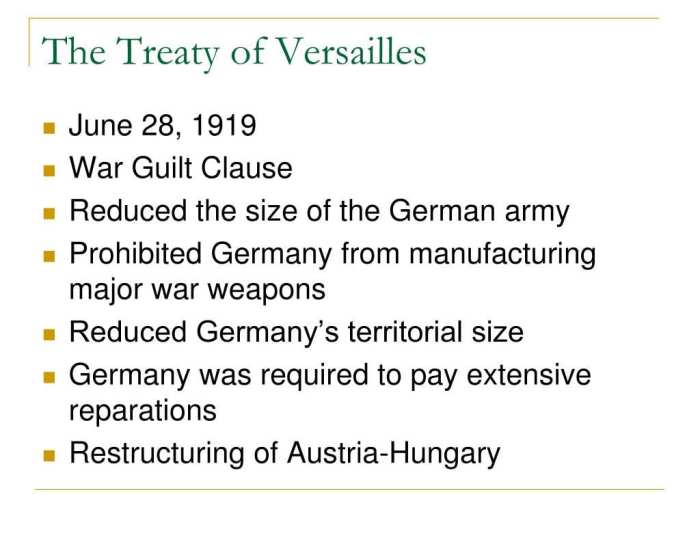The Treaty of Versailles Worksheet Answer Key PDF unveils the intricate tapestry of the Treaty of Versailles, providing an in-depth exploration of its historical significance and far-reaching consequences. This comprehensive guide offers a clear understanding of the treaty’s key provisions, impact on Germany, international implications, and enduring legacy.
The worksheet and answer key provide a structured framework for delving into the complexities of the treaty, facilitating a deeper comprehension of its multifaceted nature.
The Treaty of Versailles
The Treaty of Versailles, signed on June 28, 1919, was a peace treaty that ended World War I and significantly reshaped the political landscape of Europe.
Historical Background: The Treaty Of Versailles Worksheet Answer Key Pdf

The treaty was the culmination of four years of intense warfare that had devastated Europe. The major powers involved were the Allied Powers (primarily France, Britain, and the United States) and the Central Powers (primarily Germany and Austria-Hungary).
Major Powers Involved and Their Objectives
- France:To weaken Germany and prevent future aggression.
- Britain:To maintain a balance of power in Europe and protect its overseas empire.
- United States:To promote peace and prevent the spread of communism.
- Germany:To avoid harsh punishment and preserve its territorial integrity.
Key Provisions of the Treaty

The Treaty of Versailles contained a number of key provisions, including:
Reparations
- Germany was required to pay reparations to the Allied Powers for war damages, amounting to 132 billion gold marks.
- These reparations were to be paid over a period of 30 years.
Territorial Changes, The treaty of versailles worksheet answer key pdf
- Germany lost territory to France, Belgium, Denmark, and Poland.
- Germany lost all of its overseas colonies.
Military Restrictions
- Germany’s military was limited to 100,000 men.
- Germany was prohibited from having an air force or submarines.
Impact on Germany
The Treaty of Versailles had a profound impact on Germany, both politically and economically.
Political Consequences
- The treaty led to the collapse of the German Empire and the establishment of the Weimar Republic.
- The treaty caused widespread resentment in Germany and contributed to the rise of extremist movements, such as the Nazi Party.
Economic Consequences
- The reparations payments imposed a heavy burden on the German economy.
- The loss of territory and colonies deprived Germany of important resources and markets.
International Implications
The Treaty of Versailles also had a significant impact on international relations.
Impact on the League of Nations
- The treaty was seen as a failure of the League of Nations, which had been established to prevent future wars.
- The League was unable to resolve the issue of German reparations and could not prevent the rise of extremist movements in Germany.
Impact on the Global Balance of Power
- The treaty weakened Germany and shifted the balance of power in Europe in favor of France and Britain.
- The treaty also contributed to the rise of the United States as a global superpower.
Historical Legacy
The Treaty of Versailles had a lasting impact on the world.
Role in Shaping the Interwar Period
- The treaty created a sense of injustice and resentment in Germany that contributed to the outbreak of World War II.
- The treaty also failed to address the underlying causes of World War I, such as nationalism and imperialism.
Contribution to the Outbreak of World War II
- The treaty’s harsh treatment of Germany is often cited as a factor that contributed to the rise of Adolf Hitler and the Nazi Party.
- The treaty’s failure to resolve the issue of German reparations also contributed to the economic and political instability that led to World War II.
User Queries
What were the main objectives of the Treaty of Versailles?
The Treaty of Versailles aimed to punish Germany for its role in World War I, prevent future aggression, and establish a new international order based on collective security.
How did the Treaty of Versailles impact Germany?
The treaty imposed harsh reparations, territorial losses, and military restrictions on Germany, leading to economic instability, political turmoil, and a rise in nationalist sentiment.
What was the international reaction to the Treaty of Versailles?
The treaty was met with mixed reactions internationally. Some nations supported its provisions, while others criticized its harshness and potential to destabilize Europe.